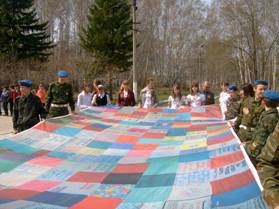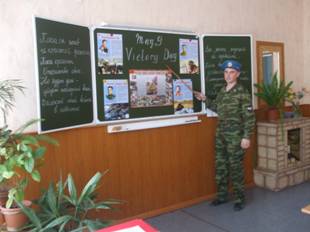Тема: «Эхо войны». (С использованием средств ИКТ. 8-й класс.)
Цель: Развитие коммуникативной компетенции по теме.
Задачи:
1) систематизировать лексические знания учащихся;
2) ознакомить с историей памятника «Солдата победителя» в Германии;
3) практиковать в умении воспринимать на слух с целью извлечения полной информации;
4) формировать навыки работы созданию проектов с помощью средств ИКТ.
Воспитательные задачи:
1) воспитывать бережное отношение к своей Родине, ее прошлому;
2) воспитывать ответственность за свои поступки, уважение к людям старшего поколения (воспитание гуманных отношений между людьми).
Оборудование: доска, папка с проектами учащихся прошлых лет, компьютер, диск с видеофрагментами «От Кремля до Рейхстага».
Ход урока
1. Организационный момент
2. На доске стихотворение Ю. Мельникова (фото военной тематики)
Пока он жив и почестей достоин,
Пока крепит Отечество свое,
Но будет день - уйдет последний воин
Далекой той войны в небытие.Вы, юные, позиций не сдавайте,
Для вас он рвал захватчиков кольцо.
Смотрите и навек запоминайте
Живого победителя лицо.
Минута молчания.
3. Звучит мелодия военных лет.
4. Прошу объяснить эпиграф в соответствии с темой войны.
«Gratitude is a sign of noble souls» (Aesop)
Благодарность - знак благородства.
5. Ответьте на вопросы. (До прослушивания текста.)
1) What day do we celebrate today?
2) Why is it so important?
3) Do you celebrate this day at home?
6. Идет подготовка к восприятию текста «День победы».
Поясняю значение слова Советский Cоюз.
7. Звучит текст «День победы».
VictoryDay
Victory Day is a great holiday in the Soviet Union and in many other countries. On this day millions of people celebrate the victory over the German fascists x in 1945. On the 9th of May Soviet people and their leaders receive many greetings from different parts of the world. It is because the Soviet Union and its army fought for all countries which were attacked by the fascists.
Today the working people of the world thank the USSR and its Communist Party for the struggle in the name of peace.
That day is celebrated by meetings and marches. People bring flowers to the monuments where war heroes lie.
We listen to what war veterans2 tell about the war and how they fought for victory.
The veterans think: «The young people must not forget the heroes, they must be ready to defend their country against all enemies.»
Then flowers and souvenirs are given to those who took part in the Great Patriotic War.
In the evening there is a holiday salute and a minute of silence4 to remember all those who did not come back from the war.
On the TV holiday concert songs of the Great Patriotic War are sung. War veterans also сome to take part in the programmes and tell how they fought for their country and how they live now.
On Victory Day we not only remember the past. We must think about the future and defend piece.
8. Выполняют задание по тексту. (Верно. Неверно.)
1) On May 9 people celebrate the anniversary of the Great Victory.
2) It is also a great holiday for all the countries.
3) The Soviet people won the Great patriotic War.
4) The people of the world should not remember about the main role of the USSR.
5) The Soviet Union lost 20 millions of their people.
9. Просмотр кадров фильма: начало и конец войны.
10. На экране проецируется картинка памятника - воина освободителя.
Прошу ответить на вопрос - знают ли ребята об истории появления данного памятника?
Учащиеся работают с текстом «Монумент в Берлине».
A Monument in Berlin (After P. Voroshilov)
In Treptov Park in Berlin there is a monument to a Soviet Army soldier. The famous Soviet sculptor Yevgeny Vuchetich made it. You see the soldier-liberator after his last battle. He is holding in his arms the child whom he has saved. Many people in the world know this monument. Berlin children bring the first spring flowers to the Soldier-Liberator. Who was this Soldier-Liberator? It is difficult to answer the question. We know only that the sculptor took the story from life.
Here is one of the stories from the last battle in Berlin. The last days of April 1945. Soviet soldiers were already in the centre of Berlin not far from the Reichstag. There was a canal on the way to the Reichstag. The bridge over the canal was mined. The enemy was on the other side of the canal. The Soviet soldiers waited for the signal to begin the attack on the Reichstag. It was very still for some time. Then suddenly the soldiers heard a child's voice. «Ma-ma, ma-ma!» it cried. The little voice came from the bridge again and again. The officers and the general heard it too.
«We must try to save that child», said the general. «I think it is under the bridge», said one of the officers, «but we have very little time before the attack».
Senior Sergeant Masalov heard the words of the general. He came up to the general and said: «Comrade general, may I try»? The general did not answer. He could not risk the life of the soldier. At last he said, «You may. Only you must come back alive».
It was only fifty metres to the bridge. Masalov began to crawl to the bridge. He looked with attention to the right and to the left. The enemy began to shoot. Masalov fell down, lay still and waited. Then he began to crawl again. The child cried, «Ma-ma». The sergeant rose and ran to the bridge. Under the bridge Masalov saw a little girl of about two years old near her dead mother. Masalov took the child in his arms and began to crawl back.
Soon with the child in his arms, Masalov was back again on the Soviet Army's side of the bridge. Somebody took the little girl from him and he ran back to his soldiers.
After the war Nikolai Masalov visited Berlin and saw the monument in Treptov Park. It has become a symbol of the Soviet Army an army of Liberation.
Ответьте по тексту на следующие вопросы:
1) Where is the monument to the Soldier-Liberator?
2) Who was the sculptor?
3) Where did the sculptor get the story from?
4) Who was the soldier who saved the child?
Найдите в рассказе 2-3 предложения, в которых дано описание следующего:
1) The monument in Treptov Park in Berlin.
2) The Soviet Army in the centre of Berlin in April 1945.
3) A child under the bridge.
4) Sergeant Masalov and the general.
5) Sergeant Masalov with a little girl in his arras.
11. Одни учащиеся отвечают на вопросы, другие находят в рассказе 2-3 предложения, в которых дано описание следующего.
12. Прошу ребят объяснить выбор учителем эпиграфа:
«Gratitude is a sign of noble souls» (Aesop)
Благодарность - знак благородства.
После прослушанных ответов проецирую на экране слова из прослушанного текста.
We should never forget those who gave their lives for our Motherland and our veterans.
13. Даю задание составить рассказ «День победы в моей семье», «День победы в моем городе».
14. Просмотр презентации Салют победы. (Презентация)

